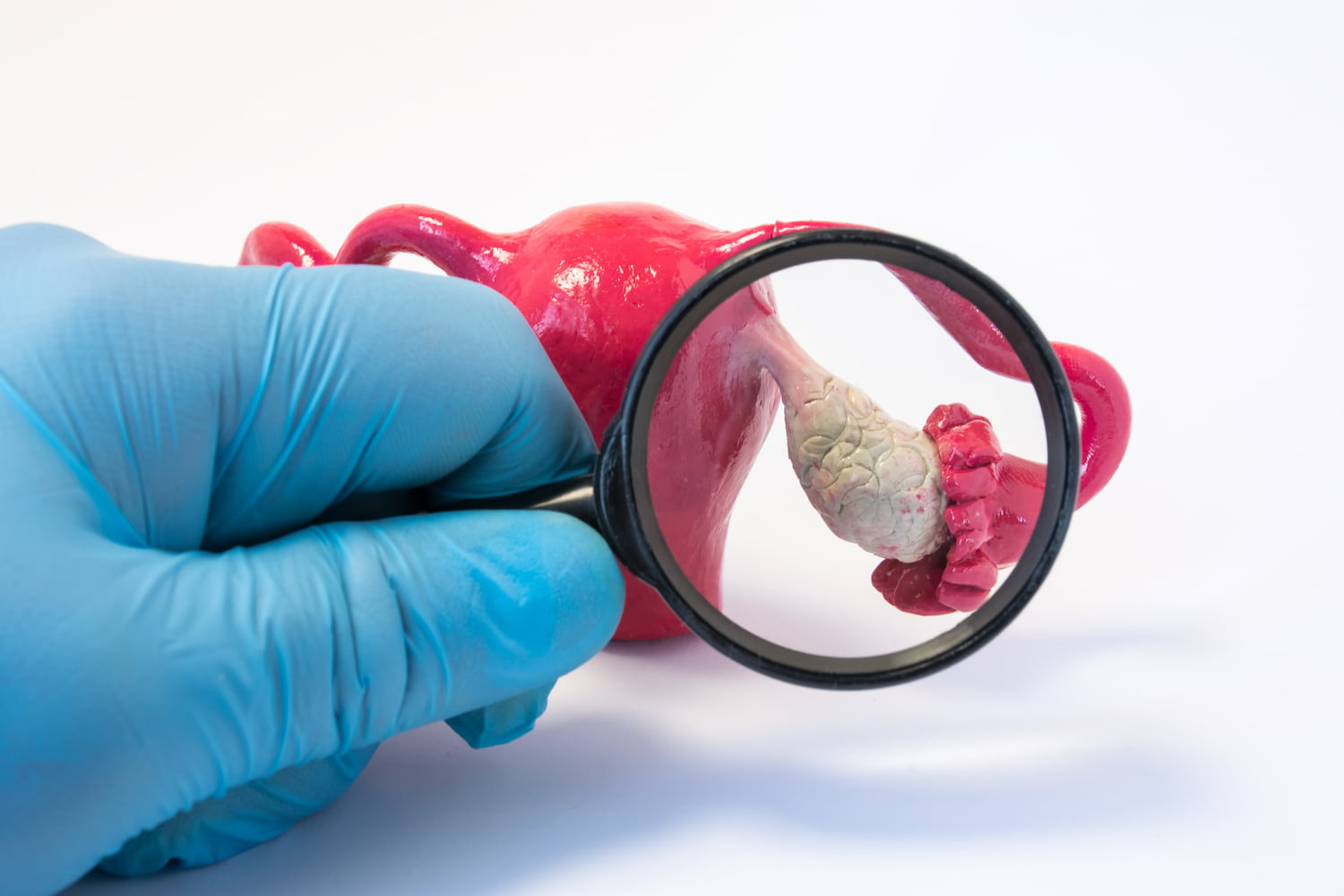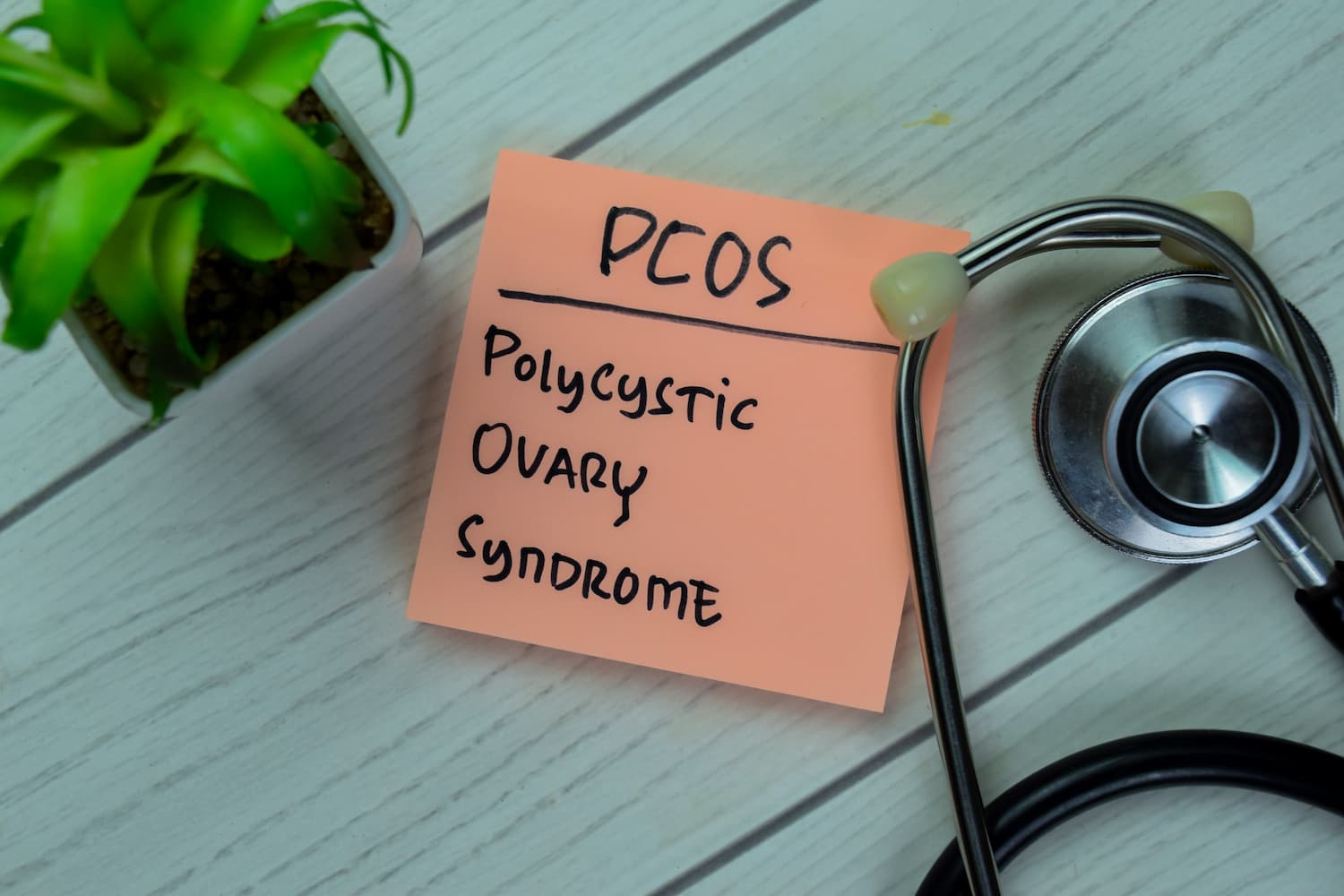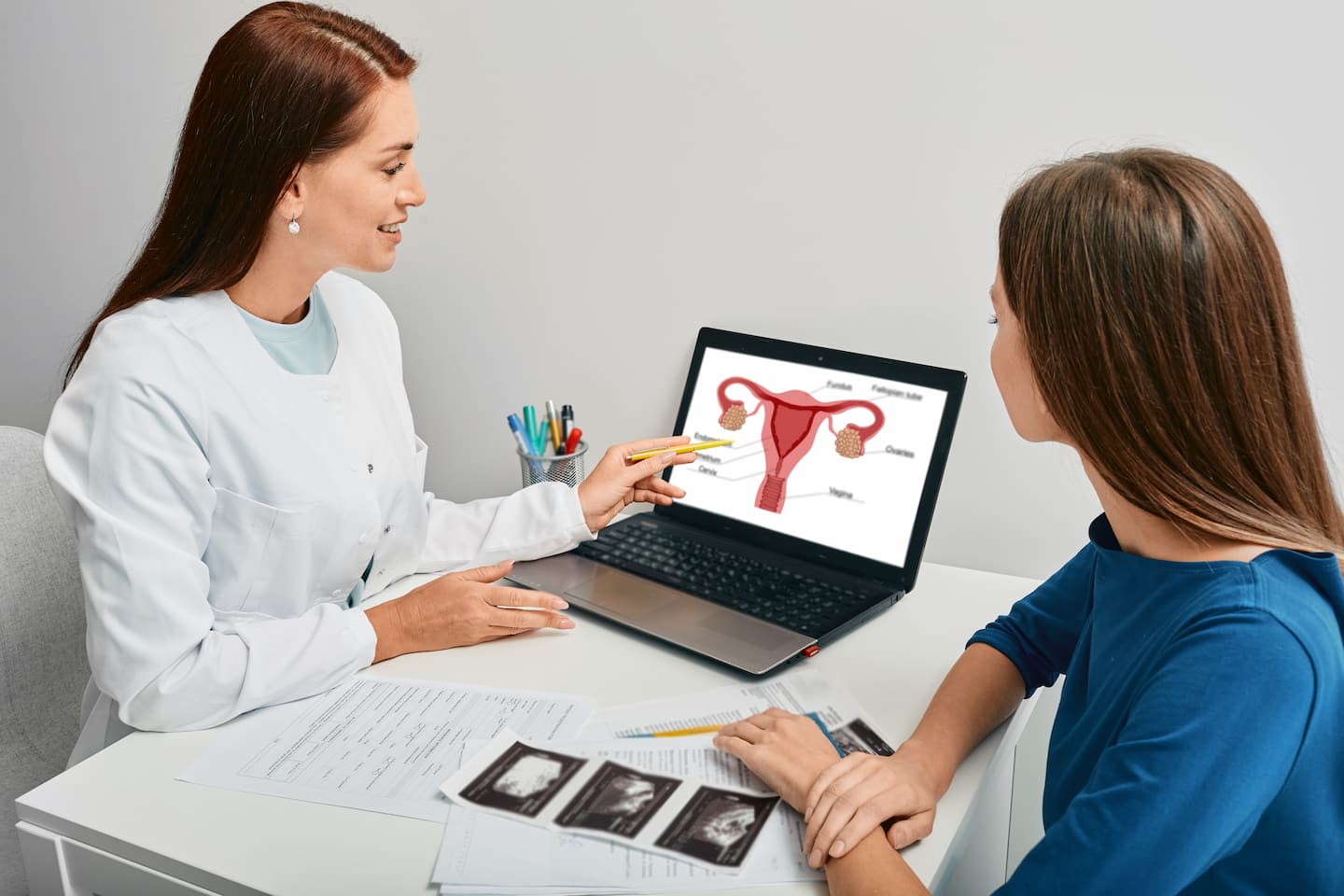Polycystic Ovary Syndrome Treatment in Turkey
Healthy Türkiye helps you find the best polycystic ovary syndrome treatment in Turkey at affordable prices and adopts a 360-degree service approach in all areas of health through affiliated hospitals.
- Medical Treatment
- Endocrinology Treatment in Turkey
- Polycystic Ovary Syndrome Treatment in Turkey
- Hypertension Treatment in Turkey
- Hyperthyroidism Treatment in Turkey
- Thyroid Disease Treatment in Turkey
- Acromegaly Treatment in Turkey
- Gigantism Treatment in Turkey
- Hirsutism Treatment in Turkey
- Hypopituitarism Treatment in Turkey
- Pediatric Endocrinology Treatment in Turkey
- Hormonal Imbalance Treatment in Turkey
- Pituitary Tumor Treatment in Turkey
- Hypothyroidism Treatment in Turkey
- Pheochromocytoma Treatment in Turkey
- Homepage
- Medical Treatment
- Polycystic Ovary Syndrome Treatment in Turkey

About Polycystic Ovary Syndrome Treatment in Turkey
Polycystic ovary syndrome (PCOS) treatment is a medical procedure in Turkey that requires coordination between specialist surgeons, anesthetists, and various other specialist medical professionals. Polycystic ovary syndrome is a condition in which the ovaries produce an abnormal amount of androgens, male sex hormones that are generally present in women in small amounts.
The name polycystic describes the numerous small cysts that form in the ovaries. But, some women with this disorder do not have cysts, while some women without the disorder do develop cysts. Treatment for PCOS is usually done with medication. Medications can’t cure PCOS, but it helps reduce symptoms and prevent some health problems.
It is thought that around 1 in 10 women have PCOS, that is at least two polycystic ovaries, raised male hormone levels, and reduced ovulation. But, these figures may be higher. Lifestyle changes and medical treatments can help you manage the signs, lower your risk of other health conditions and get pregnant. Polycystic ovary syndrome is a common cause of infertility and can be linked to other diseases. You can talk to freely Healthy Türkiye expert doctors about your symptoms if you suspect you have PCOS.

PCOS Treatment in Turkey
PCOS or polycystic ovarian syndrome is a complex hormonal condition. ‘Polycystic’ translates as ‘many cysts’. It refers to the many partially formed follicles on the ovaries, which each contain an egg. These rarely grow to maturity or create eggs that can be fertilized.
Women with PCOS typically have high levels of insulin that don’t work effectively or male hormones known as ‘androgens’, or both. The cause is not completely understood, however, family history and genetics, hormones, and lifestyle play a role. Women who have a mother, aunt, or sister with PCOS are 50% more likely to develop PCOS. It is also more common in women of Asian, Aboriginal, Torres Strait Islander, and African backgrounds.
Many patients don’t even realize they have the condition until they have trouble getting pregnant or are gaining weight for unknown reasons. It’s also possible to have mild PCOS, where the signs are not severe enough for you to notice.
Common Symptoms of Polycystic Ovary Syndrome
Some women start seeing signs around the time of their first period. Other women can only discover they have PCOS after they’ve gained a lot of weight or they’ve had trouble getting pregnant. The most common polycystic ovary syndrome symptoms are:
Irregular periods: A lack of ovulation prevents the uterine lining from shedding. Some women with polycystic ovary syndrome get fewer than 8 periods a year or none at all
Heavy bleeding: The uterine lining builds up for a longer period of time, so the periods they do get can be heavier than normal.
Hair growth: More than 70% of women with this condition grow hair on their face and body including on their back, belly, and chest. This excess hair growth is called hirsutism.
Acne: Male hormones can make the skin oilier than usual and cause breakouts in areas like the face, chest, and upper back.
Weight gain: Up to 80% of women with polycystic ovary syndrome are overweight or have obesity.
Male pattern baldness: Hair on the scalp gets thinner and can fall out.
Darkening of the skin: Dark patches of skin may form in body creases like those on the neck, in the groin, and under the breasts.
Headaches: Hormone changes may trigger headaches in some women.
Causes of Polycystic Ovary Syndrome
The exact cause of polycystic ovary syndrome isn’t known. Factors that may play a role include:
Insulin resistance: Insulin is a hormone that the pancreas makes and it allows cells to use sugar, your body’s primary energy supply. If cells become resistant to the action of insulin, then blood sugar levels can go up and this can cause your body to make more insulin to try to bring down the blood sugar level. Too much insulin might cause the body to make too much of the male hormone androgen. You could have trouble with ovulation which is the process where eggs are released from the ovary.
Low–grade inflammation: White blood cells make substances in response to infection or injury, this is called low-grade inflammation. Studies show that people with polycystic ovary syndrome have a type of long-term, low-grade inflammation that leads polycystic ovaries to produce androgens.
Heredity: Studies suggest that certain genes might be linked to polycystic ovary syndrome. Having a family history of polycystic ovary syndrome may play a role in developing the condition.
Excess androgen: With polycystic ovary syndrome, the ovaries may produce high levels of androgen. Having much androgen interferes with ovulation. It means that eggs don’t develop on a regular basis and aren’t released from the follicles where they develop.

We Care About Your Health
Healthy Türkiye provides the best for your health and comfort. You will feel privileged with us.
7/24 Quality Personal Assistance Throughout Your Journey
Customizable for You All-Inclusive Packages
Get the Right Advice for your Health
Types of Polycystic Ovary Syndrome Treatment in Turkey
Your doctor will determine treatment based on your symptoms, medical history, and other health conditions, and if you want to get pregnant. In Turkey, polycystic ovary syndrome treatments can include medications, lifestyle changes, or a combination of both.
Lifestyle Changes for Polycystic Ovary Syndrome Treatment in Turkey
Healthy Türkiye doctors often recommend making lifestyle changes to manage the symptoms of polycystic ovary syndrome and prevent complications.
Reduce Carbohydrates and Sugar: Many women with polycystic ovary syndrome also have insulin resistance, in which the body doesn’t use the hormone insulin effectively. Insulin, which is created by the pancreas, enables the body to use glucose, or sugar, from food for energy. It likewise helps keeps blood sugar levels in check. To lower blood sugar, your doctor may recommend a diet low in sugar and other simple carbohydrates.
The ideal diet consists of a variety of foods from various food groups, including healthy carbohydrates, such as vegetables and fruits; lean meats, such as poultry; fish; and high-fiber grains. Doctors suggest focusing on foods that are low in sugar and fat and have a low glycemic index. Low glycemic index foods cause the body to release insulin gradually and steadily, making it easier for your body to use food as energy rather than store it as fat. Foods high in fiber also can help control blood sugar levels.
Because carbohydrates are broken down into sugar, it’s beneficial to limit the amount you consume. You should avoid refined carbs, which are found in processed foods, especially white flour, rice, potatoes, and sugar.
Manage Weight: Many, but not all, women with polycystic ovary syndrome are overweight and in time, they may become obese. That can cause many health problems, including infertility, type 2 diabetes , and cardiovascular disease. To help you lose weight, Healthy Türkiye’s registered dietitians and nutritionists can create a healthy diet low in fat and calories. It is important to remember, paying attention to portion size is also key to losing weight.
Exercise Regularly: Regular exercise has many benefits in treating polycystic ovary syndrome. It helps you fight obesity by burning calories and building muscle mass, which decreases insulin resistance. Exercise can also help lower cholesterol levels and those of other hormones.
Medication for Polycystic Ovary Syndrome Treatment in Turkey
Doctors can prescribe medication for women with polycystic ovary syndrome to control symptoms. Symptoms can include irregular menstrual periods, excessive facial and body hair, acne, and thinning scalp hair. Medication may also help prevent the long-term complications of polycystic ovary syndrome, which are usually due to insulin resistance, in which the body has trouble effectively using the hormone insulin, which regulates blood sugar.
Combination birth control pills: Pills that include both estrogen and progestin decrease androgen production and regulate estrogen. Controlling your hormones can lower your risk of endometrial cancer and correct irregular bleeding, excess hair growth, and acne.
Progestin therapy: Taking progestin for 10-14 days every 1-2 months can regulate your periods and protect against endometrial cancer. Progestin therapy doesn’t improve androgen levels and won’t prevent pregnancy. The progestin-only minipill or progestin-containing intrauterine appliance is a better choice if you also wish to avoid pregnancy.
To help you ovulate so that you can become pregnant, your doctor might recommend:
Clomiphene: This oral anti-estrogen drug is taken during the first part of your menstrual cycle.
Letrozole (Femara): This is used normally for breast cancer treatment and can work to stimulate the ovaries.
Metformin: This drug for type 2 diabetes that you take by mouth improves insulin resistance and lowers insulin levels. If you don’t become pregnant using clomiphene, your doctor might recommend adding metformin to help you ovulate. Also, if you have prediabetes, metformin can slow the progression to type 2 diabetes and help with weight loss.
Gonadotropins: These hormone drugs are given by injection.
To reduce excessive hair growth or improve acne, your doctor might recommend:
Birth control pills: These pills decrease androgen production which can cause excessive hair growth and acne.
Spironolactone (Aldactone): This drug blocks the effects of androgen on the skin, including excessive hair growth and acne. Spironolactone may cause birth defects, so effective birth control is needed while taking this medication. This medication isn’t suggested if you’re pregnant or planning to become pregnant.
Eflornithine (Vaniqa): This cream is used for slow facial hair growth.
Hair removal: Electrolysis and laser hair removal are two alternatives for removing hair. Electrolysis uses a small needle inserted into each hair follicle, the needle sends out a pulse of electric current. The current damages and then destroys this follicle. Laser hair removal is a medical method that uses a concentrated beam of light to remove unwanted hair. You might require multiple treatments of electrolysis or laser hair removal.
Acne treatments: Medications, including pills and topical creams or gels, can help improve acne.
Surgery: Laparoscopic Ovarian Drilling in Turkey
A surgical procedure called laparoscopic ovarian drilling (LOD) may be a treatment option for PCOS. This is for fertility problems with PCOS that do not respond to drugs.
Under general anesthetic, the doctors will make a small cut in your tummy. Then, they will pass a laparoscope into your tummy. The ovaries will then be surgically treated using heat or a laser by placing 4-5 tiny openings into the surface of one of your ovaries. This will destroy the tissue that’s producing androgens. This operation can correct your hormone imbalance and restore the normal function of your ovaries.

2026 Cost of Polycystic Ovary Syndrome Treatment in Turkey
All types of medical attention like polycystic ovary syndrome treatment are very affordable in Turkey. Many factors are also included in determining the cost of polycystic ovary syndrome treatment in Turkey. Your process with Healthy Türkiye will last from the time you decide to have a polycystic ovary syndrome treatment in Turkey until the time you are fully recovered even if you are back home. The exact polycystic ovary syndrome treatment procedure cost in Turkey depends on the type of operation involved.
The cost of polycystic ovary syndrome treatment in Turkey does not demonstrate many variations in 2022. Compared to costs in developed countries like the United States or the UK, polycystic ovary syndrome treatment costs in Turkey are relatively low. So, it’s no wonder patients from across the world visit Turkey for polycystic ovary syndrome treatment procedures. However, the price is not the only factor affecting choices. We suggest looking for hospitals that are safe and have polycystic ovary syndrome treatment reviews on Google. When people decide to seek medical help for polycystic ovary syndrome treatment, they will not only have had low-cost procedures in Turkey, but also the safest and best treatment.
At clinics or hospitals contracted with Healthy Türkiye, patients will receive the best polycystic ovary syndrome treatment from specialist doctors in Turkey at affordable rates. Healthy Türkiye teams to provide medical attention to polycystic ovary syndrome treatment procedures and high-quality treatment to patients at a minimum cost. When you contact Healthy Türkiye assistants, you can get free information about the cost of polycystic ovary syndrome treatment in Turkey and what this cost covers.
Why Is Polycystic Ovary Syndrome Treatment Cheaper in Turkey?
One of the main considerations before traveling abroad for polycystic ovary syndrome treatment is the cost-effectiveness of the whole process. Many patients think that when they add flight tickets and hotel expenses to their polycystic ovary syndrome treatment costs, it will become very expensive to travel, which is not true. Contrary to popular belief, round-trip flight tickets to Turkey for polycystic ovary syndrome treatment can be booked very affordably.
In this case, assuming you are staying in Turkey for your polycystic ovary syndrome treatment, your total travel expense of flight tickets and accommodation will only cost less than any other developed country, which is nothing compared to the amount that you are saving. The question “why is polycystic ovary syndrome treatment cheaper in Turkey?” is so common between patients or people simply curious about getting their medical treatment in Turkey. When it comes to polycystic ovary syndrome treatment prices in Turkey, there are 3 factors that allow cheaper prices:
The currency exchange is favorable for whoever looking for polycystic ovary syndrome treatment has a euro, dollar, or pound;
The lower cost of living and cheaper overall medical expenses such as polycystic ovary syndrome treatment;
For polycystic ovary syndrome treatment, incentives are given by the Turkish Government to medical clinics working with international clients;
All these factors allow for cheaper polycystic ovary syndrome treatment prices, but let’s be clear, these prices are cheaper for people with strong currencies (as we said, euro, dollar, Canadian dollar, pound, etc).
Every year, thousands of patients from all over the world come to Turkey to get polycystic ovary syndrome treatment. The success of the healthcare system has increased in recent years, especially for polycystic ovary syndrome treatment. It’s easy to find well-educated and English-speaking medical professionals in Turkey for all kinds of medical treatment such as polycystic ovary syndrome treatment.

Why Choose Turkey for Polycystic Ovary Syndrome Treatment?
Turkey is a common choice among international patients seeking advanced polycystic ovary syndrome treatment. Turkey’s health procedures are safe and effective operations with a high success rate like polycystic ovary syndrome treatment. The increasing demand for high-quality polycystic ovary syndrome treatment at affordable prices has made Turkey a popular medical travel destination. In Turkey, polycystic ovary syndrome treatment is performed by highly experienced and trained doctors with the most advanced technology in the world. polycystic ovary syndrome treatment is done in Istanbul, Ankara, Antalya, and other major cities. The reasons for choosing polycystic ovary syndrome treatment in Turkey are as follows:
High-quality hospitals: Joint Commission International (JCI) accredited hospitals have dedicated polycystic ovary syndrome treatment units that are specially designed for patients. International and national strict protocols provide effective and successful polycystic ovary syndrome treatment for patients in Turkey.
Qualified experts: The expert teams include nurses and specialist doctors, together to carry out polycystic ovary syndrome treatment according to the patient’s needs. All the included doctors are highly experienced in performing polycystic ovary syndrome treatment.
Affordable price: The cost of polycystic ovary syndrome treatment in Turkey is affordable compared to Europe, the USA, the UK, Singapore, Australia, etc.
The high success rate: Highly experienced specialists, the best available technology, and stringently followed safety guidelines for post-operative care of the patient, resulting in a high success rate for polycystic ovary syndrome treatment in Turkey.
Is Polycystic Ovary Syndrome Treatment Safe in Turkey?
Did you know Turkey is one of the most visited destinations for polycystic ovary syndrome treatment in the world? It is ranked one of the most visited tourist destinations for polycystic ovary syndrome treatment. Over the years it has also come to be a very popular medical tourism destination too with many tourists coming in for polycystic ovary syndrome treatment. There are so many reasons why Turkey stands out as a leading destination for polycystic ovary syndrome treatment. Because Turkey is both safe and easy to travel to too with a regional airport hub and flight connections to pretty much everywhere, it is preferred for polycystic ovary syndrome treatment.
The best hospitals in Turkey have experienced medical staff and specialists who have performed thousands of medical services such as polycystic ovary syndrome treatment. All procedures and coordination related to polycystic ovary syndrome treatment are controlled by the Ministry of Health in accordance with the law. Over many years, the greatest progress in medicine has been observed in the field of polycystic ovary syndrome treatment. Turkey is known among foreign patients for its great opportunities in the area of endocrinology treatment in Turkey.
To emphasize, besides the price itself, the key factor in selecting a destination for polycystic ovary syndrome treatment is certainly the standard of medical services, the hospital staff’s high expertise, hospitality, and the safety of the country.
All-Inclusive Package for Polycystic Ovary Syndrome Treatment in Turkey
Healthy Türkiye offers all-inclusive packages for polycystic ovary syndrome treatment in Turkey at much lower prices. Extremely professional and experienced doctors and technicians carry out high-quality polycystic ovary syndrome treatment. The cost of polycystic ovary syndrome treatment in European countries can be quite expensive, especially in the UK. Healthy Türkiye provides cheap all-inclusive packages for a long and short stay of polycystic ovary syndrome treatment in Turkey. Because of many factors, we can provide you with many opportunities for your polycystic ovary syndrome treatment in Turkey.
The price of polycystic ovary syndrome treatment differs from other countries due to medical fees, staff labor prices, exchange rates, and market competition. You can save much more in polycystic ovary syndrome treatment compared to other countries in Turkey. When you purchase the polycystic ovary syndrome treatment all-inclusive package with Healthy Türkiye our healthcare team will present of hotels for you to choose from. In polycystic ovary syndrome treatment travel, you will have the price of your stay included in the all-inclusive package cost.
In Turkey, when you purchase polycystic ovary syndrome treatment all-inclusive packages through Healthy Türkiye, you will always receive VIP transfers. These are provided by Healthy Türkiye, which is contracted with highly qualified hospitals for polycystic ovary syndrome treatment in Turkey. Healthy Türkiye teams will organize everything about polycystic ovary syndrome treatment for you and have you picked up from the airport and safely brought to your accommodation.
Once settled in the hotel, you will be transferred to and from the clinic or hospital for polycystic ovary syndrome treatment. After your polycystic ovary syndrome treatment has been successfully completed, the transfer team will return you to the airport in time for your flight home. In Turkey, all packages of polycystic ovary syndrome treatment can be arranged upon request, which relaxes the minds of our patients.
The Best Hospitals in Turkey for Polycystic Ovary Syndrome Treatment
The best hospitals in Turkey for polycystic ovary syndrome treatment are Healthy Türkiye, Memorial Hospital, Acıbadem International Hospital, and Medicalpark Hospital. These hospitals attract patients from all over the world seeking polycystic ovary syndrome treatment due to their affordable prices and high success rates.
Best Doctors and Surgeons in Turkey for Polycystic Ovary Syndrome Treatment
The best doctors and surgeons in Turkey for polycystic ovary syndrome treatment are highly skilled professionals who offer specialized care and advanced procedures. With their expertise and state-of-the-art techniques, these specialists ensure that patients receive high-quality polycystic ovary syndrome treatment and achieve optimal health results.

Frequently Asked Questions
Unmanaged polycystic ovary syndrome can impact short and long-term health. It’s associated with type 2 diabetes, infertility, cardiovascular disease, obesity, sleep apnea, non-alcoholic fatty liver disease, and depression.
The exact cause of polycystic ovary syndrome is unknown, but it’s thought to be related to abnormal hormone levels.
Sugary drinks.
While some research has shown more than a doubling of the risk of ovarian cancer in women with PCOS, scientists have not confirmed these links in large population studies, and further studies hint that women with PCOS may have a lower risk of ovarian cancer.
Usually, symptoms first appear in adolescence, around the start of menstruation. However, some women do not develop signs until their early to mid-20s. Although polycystic ovary syndrome presents early in life, it persists through and beyond the reproductive years.
Having polycystic ovary syndrome does not mean you can’t get pregnant. Polycystic ovary syndrome is one of the most common, but treatable, causes of infertility in women.
Transvaginal ultrasound is one of the main devices a doctor has when it comes to diagnosing polycystic ovary syndrome.
Endocrinologists.
Polycystic ovaries do not cause pain.
